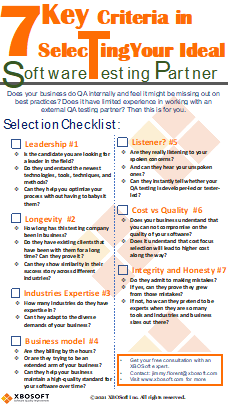
The Best Guide To Outsource QA, Available NOW!!!
You need to outsource your QA if your software system must be highly reliable, stable, and allow you to provide an excellent end-user experience, but you are:
❖ Experiencing quality challenges with your new product platforms,
❖ Trying to figure out what you are missing and could improve from a software quality perspective.
❖ Looking for an outsider view on your QA process that can assess what you are currently doing and give you some guidance.
1. Few Guidelines before you Outsource your QA
1.1 If you want to outsource QA, THINK LONG-TERM
The best way to succeed in the quality assurance of your company is to look for a partner. That implies your mindset should be in finding a QA and software testing source with which you can associate yourself over the long term. This partner should handle your software as if it was theirs and, therefore, act as an extension of your company. That’s important if you want to maintain a high-quality level for your software over time.
1.2 Watch out for their BILLING PROCESS
As a business, you don’t want to find an end-of-month bill that does not match your initial expectations. Nor do you want to chase after billable hours you do not understand nor can trace. Instead, you want a partner that does everything it takes to get the job done and that bills you clearly and honestly.
1.3 Find a partner willing to GO THE EXTRA MILE
A great QA company does more than what you ask them to do. They should be interested in your objectives and your goals and be willing to do whatever it takes to help meet those goals. In addition, they must display enthusiasm for making your software the best it can be. That means this supplier can recommend the best testing tools, challenge the ones you might currently be using and deliver more than what you expected. That’s how you get reviews such as this one from Blackline.
2. Checklist of how to select the perfect software testing partner
In our previous post we went over what you should look for when selecting a software testing partner. Your ideal software testing partner should display:
❖ Leadership
❖ Longevity in business
❖ Industries expertise
❖ Have a great business model
❖ Be a listener
❖ Help you understand Quality of your software is more important than cost
❖ Have Integrity and Honesty
Now let’s look at the pros of outsourcing QA versus the cons of internal quality assurance.
3. Advantages if you outsource QA
There are many advantages to outsourcing your company’s QA. The first one deals with focus.
 3.1 Better Focus when you outsource QA
3.1 Better Focus when you outsource QA
In our previous post, If You Are Doing This Stop Right Now | QA Developers, we discussed the fundamental problems organizations face when relying on developers to do their QA and software testing. One of these challenges is that the business diverts resources away from developing its software. And this lack of focus ultimately hurts the overall quality of this software. Therefore, outsourcing your QA could help solve this issue by removing the burden from your developers’ shoulders, and ultimately allowing them to focus on their job.
3.2 No surprise
One of the advantages of outsourcing your QA to a good software testing partner is clarity. Because the project’s cost and scope are well defined in advance and agreed upon, companies have a very clear idea about what they are getting for the money they invest. For example, we like to work on a three-month trial period (with a 30-days exit option) with our customers where no one is tied-up by a lengthy contract or is billed hourly.
3.3 Expertise
3.3.1. Technical expertise
When you outsource QA to a team of professional testers, you are likely to receive the best recommendations as far as tools are concerned. In contrast, one limitation of doing QA internally with your existing team is that many businesses do not necessarily use the best testing tools. Indeed, sometimes team inside the business are unaware of new and better solutions available in the market. That’s why we like to thoroughly evaluate our customers’ existing tools versus other ones that might better meet their needs, then provide recommendations on these alternatives. The other aspect of technical expertise comes from the qualification level of these outside QA team members. Therefore, a few questions you can ask QA and software testing companies you are trying to select are:
- Do you have professional certifications such as:
- ISTQB (advanced software testing)
- PMP certificate (for project management expertise)
- Agile Scrum Master
- And are you certified ISO27001 (Client confidentiality & Protection of Data)?
3.3.2. Industry expertise
Another benefit of outsourcing QA is the wealth of industries expertise this professional team can bring to your business. There are tremendous values of working with a QA service provider that dealt with companies of different sizes, regulatory demands, and testing requirements (for example, fully automated versus hybrid automation). Indeed, you get a creative team that can find ingenious ways and tools to solve your problems. So, what you could ask your target QA partners are:
- How many industries do you have expertise in?
- What benefits can we draw from the different industries you have serviced?
3.4 A fresh view
Sometimes businesses lose focus on what matters and how to deal with the onslaught of testing issues they might face. That’s when an outside perspective can prove helpful to examine your software from a user point of view. The members of your outsourced QA partner can find things that aren’t necessarily bugs but might aggravate end-users experience. Good questions to ask are:
- Is our current QA process optimized?
- What is your onboarding process with new customers?
- What other/better way to implement API?
- What should we automate in priority?
3.5 Better management of your budget
If you are a small company, you need lots of different QA skills such as performance, automation, API testing, requirements story writing… If you can not hire all these staff, why not use a 3rd party who already has these people and is a specialist? A QA specialist would save you time and money by just being an expert in their field. In addition, their expertise will help you prioritize the testing tasks you should undertake. And since this budget issue ties in with focus, prioritizing developing your software and making it the most competitive possible is probably crucial and an excellent justification for why you would outsource QA.
3.6 Precious help during your QA peaks
You probably have peaks and valleys in testing needs and could require many platforms tested that change over time. This is an excellent justification for using an outside party that can handle your peaks, has specialized equipment, and constantly updates their device library, so you don’t have to.
3.7 Visibility
Many businesses do not know where to start in their QA process. Sometimes they even struggle on how to select a great QA partner. That’s where a QA specialist can come in, analyze your software after they have had a prior conversation with you and your team, then develop a proper road map. The latter will include your goals and priorities, understanding of your software, and current situation to accomplish objectives.
4. Weaknesses of internal qa
4.1 QA is developer-led
Often internal QA is developer-led and therefore has two inherent weaknesses. First, the developer is not a QA expert and can not implement best practices on the job. Second, because he is too spread, the quality of your software will suffer from that lack of full-time commitment. We often see businesses that reach a ceiling with their internal QA and are unsure whether they are using the best tools or implementing the best practices.
4.2 Instable resources
Because many businesses initially think of QA as the fifth wheel of the overall software or app development process, they do not put deep thoughts on the skillset needed to perform QA and software testing. As a result, some organizations might have hundreds of developers and almost no software testers. There is also the unpredictable turnover in such a specialized area, leaving many companies in a bind. Moreover, the recent “work from home” culture further amplified this problem with companies’ and employees’ expectations diverging.
4.3 Skillset and best practices not readily available
That’s another reason to justify why businesses want to outsource QA. Internal QA often time lacks a structured approach to QA and software testing. As a result, many businesses come to us with comments such as “We need someone to set up the framework so it’s consistent from product to product” or “We are stable and robust on the API side but have nothing anywhere else.” If that sounds like your current situation, then you need to contact us right NOW!!!
4.4 Only focused on their industry.
With this mindset comes the lack of visibility on whether better ways to creatively tackle challenges exist. This problem ties up with the internal resource problem we highlighted since it’s easy to form bad habits and become somewhat complacent about how people do things internally.
Watch the video here:
You can find us on:
You might also like:
 |
 |
 |
||
| Stop Right Now QA Developers | Agile Testing Solution market shows growth | Key Challenges of Mobile Application Quality Assurance | ||
| By: Jimmy Florent | By: Philip Lew | By: Jimmy Florent |
Best Guide To Outsource QA
November 23, 2021
Table of Contents
- Few Guidelines before you Outsource your QA
1.1. If you want to outsource QA, THINK LONG-TERM
1.2. Watch out for their BILLING PROCESS
1.3. Find a partner willing to GO THE EXTRA MILE
Most Popular
 |
Stop Right Now QA Developers
By: Jimmy Florent |
|
 |
The 7 Best Reasons For Justifying A Quality Assurance Program In Your Business
By: Jimmy Florent |
|
 |
5 Proven Signs Your In House Software Is Plagued With DDSS
By: Jimmy Florent |
|

